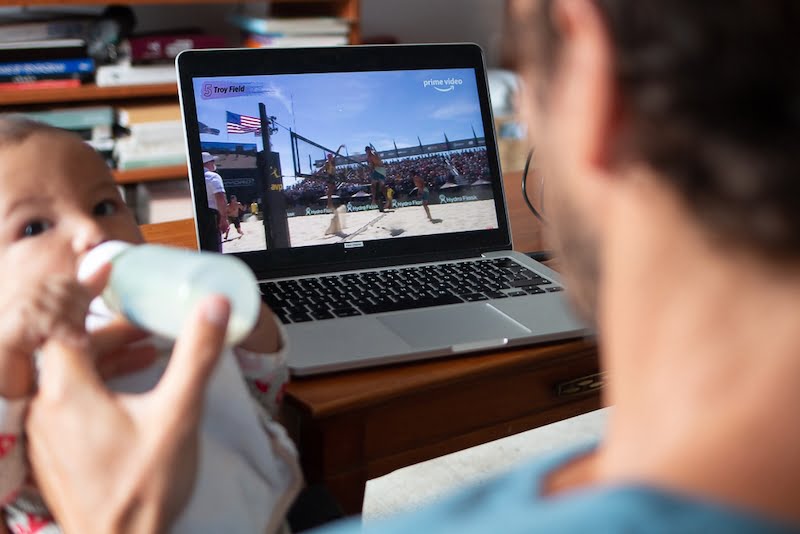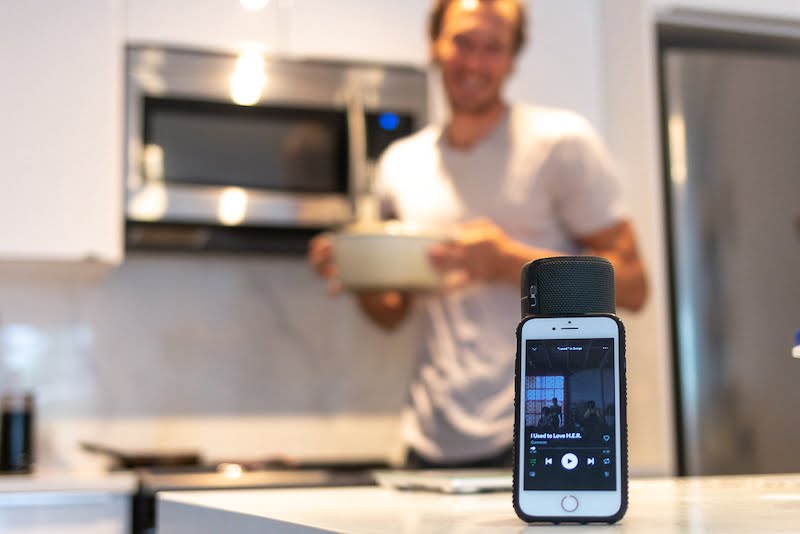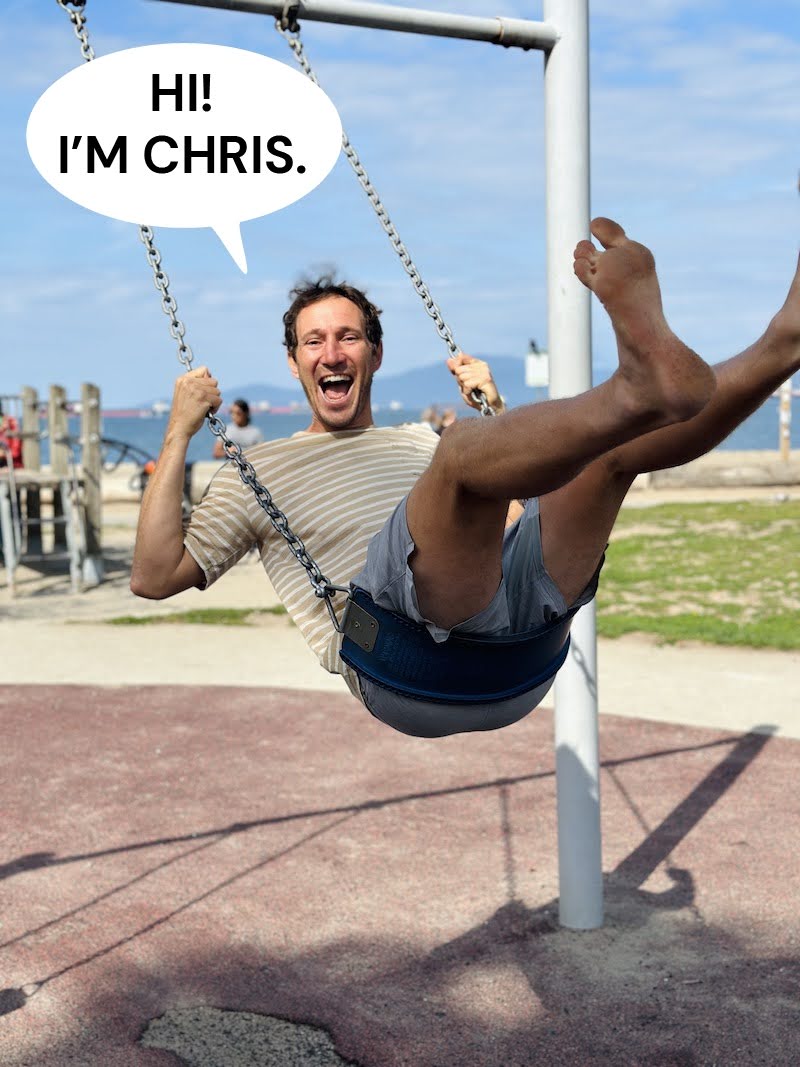Overeaters get diabetes from eating too much, too quickly, too frequently. Over-listeners get involuntary eye twitches.
At least I do.
I was gluttonously gorging on six hours worth of podcasts a day at double speed (so three hours actual listening time). Any chance I had to cram my ear canals with content, from bathroom breaks to taking out the trash to changing Zac’s diaper, I’d take it.
I knew it was too much. But I couldn’t resist. My podcast feed was too enticing. So I resorted to drastic measures:
Just as people fast to reset their metabolism and their relationship with food, I did a podfast.
I quit listening to podcasts for a month. Or, at least I tried.
Lesson #1: A Stricter Diet

These days, I spend a large chunk of my days holding a bottle in the mouth of my fresh-out-the-womb son, Zac, as he leisurely sips the milk as if it’s a Beyerskloof Diesel Pinotage. And while he binged on milk, I’d binge on podcasts…
…until it came time for my podfast.
I tried going old-school and heeding the veteran parents who advised Kim and me to “cherish the experience.” But something quickly became apparent: those people haven’t had to feed a baby six times a day recently. As a spectator activity, watching a baby empty a bottle barely rates higher than paint drying.
So I gave up on “cherishing.”
Instead, I decided to use that time to improve my beach volleyball skills.
Before each feeding, I cued up a Better at Beach or McKibbin Brothers video to learn cues and tips and fill my mental video bank with clips of pros who I could later imitate à la Inner Game of Tennis.
Now, you might ask, Isn’t replacing podcasts with other mediums of mental stimulation, like YouTube, cheating?
Kinda.
But also kinda not.
Consuming podcasts from your feed like eating from a hotel breakfast buffet. You look at what’s put in front of you and pick the most appetizing items, even it’s not the most appetizing or healthy.
Watching volleyball videos on YouTube is more like following a diet I prescribed for myself.
And it worked! My game made noticeable improvements. Nothing crazy, but I’d say the gains I made were more impactful than whatever I’d have otherwise gotten from stuffing my brain with a smorgasbord of podcast episodes.
Arguably, you could do a single-topic diet with podcasts instead of YouTube. But I find it’s too difficult to search and filter episodes by topic. There’s no YouTube-like search engine for podcasts yet.
Until then, I’ll stick to this new YouTube information dieting strategy of mine.
Lesson #2: Reacquainting With Music

My gateway drug into podcasts back in 2008 was Bill Simmons’ sports takes. The pleasure I got from listening to him and his buddies inspired me to dabble in other subjects. So I tried RadioLab, This American Life, Freakonomics, and so on.
By 2013, my podcast feed was so backlogged that I didn’t have time for music anymore. “Podcasts are way more educational than music,” I reasoned. I went so far as to delete the music app on my phone to open up storage space for more podcast episodes.
This meant that when my month of podcast abstinence came around, I had to download Spotify to be able to listen to music again.
It felt like meeting up with a long-lost love: awkward, yet familiar and nostalgic. And, like long-lost loves are wont to do, music had changed a lot in our eight years apart—and not in a good way. I used to love hip hop, but the new stuff Spotify recommended to me was all mumbly, crappy, auto-tuned trap and Drake.
Ugh. The classic song I Used to Love H.E.R. by Common came to mind. I felt old and out of touch.
But I persevered.
Instead of trusting Spotify, I made my own playlists of what are now old-school songs from the ’90s and ’00s. It was just like old times.
And it was better than listening to podcasts in many ways:
- More motivating: Believe it or not, it turns out that listening to MOP scream at me to Ante Up motivates me to work out harder than Tim Ferriss asking some “top-performer” what books they tend to give as gifts.
- More fun: Making food felt slightly less tedious, and Kim didn’t mind if I played music on her speaker, which would never fly with Tyler Cowen at 1.9 speed.
- More engaging: Zac seemed to enjoy my Biggie Smalls rap-a-longs and spontaneous freestyles a lot more than Dog Walk Snake Drafts.
- More revitalizing: My brain didn’t feel as fried when I tried to get back to work after.
Thanks to temporarily quitting podcasts, music has become a part of my life again. Our relationship is not the same as it used to be, but it’s good.
Lesson #3: Back to Actual Life

There’s an implicit trade-off you make by listening to podcasts: You get other people’s ideas in your brain at the expense of coming up with your own.
In many ways, I think making this trade has paid off. Listening to podcasts has:
- Provided me with a ton of excellent book recommendations.
- Exposed me to tons of thought starting ideas, the best of which I share in Consider This.
- Reignited my curiosity, which, I think, makes me more creative.
But I’ve started to wonder if I overrate these gains. It’s not like I had no books to read, no interesting ideas, and no curiosity before podcasts began invading my brainwaves back in 2008.
What if podcasts were never invented? Would my life be any worse off?
Probably not.
So going into my podfast, I had high hopes for my more-bored-than-usual brain. I expected it to use the RAM I was freeing up to come up with multiple eureka moments that would take this blog, the videos I’m making, and my life in general to new levels.
But it didn’t pan out that way. Mostly, my brain seems to have used its time off from digesting double-speed podcasts the way most employees use their vacation days: to rest.
But…
(Actually, it’s a big but.)
BUT…
Temporarily quitting podcasts took me away from the vortex of pseudo and genuine intellectuals competing to convince me that their ideas are super important. And it refocused me on something more important:
Actually living life.
Rather than listening to other people talk about their lives and others’, not listening to podcasts refocused me on experiencing cool stuff in my own life. And when I had nothing cool going on, I thought about cool things I could do in the future.
It also got me questioning the merits of some of the pie-in-the-sky philosophical stuff I’ve recently written on this blog. Maybe we’re better off thinking less and doing more.
Or maybe not. Like listening to podcasts, I suppose it’s a trade-off. You have to tinker with it to find the right balance.
Lesson #4: Controlling the Craving

Despite the benefits, I failed my mission of quitting podcasts for a whole month.
Had I podfasted in February, I would have made it. But I did it in July.
Maybe I’m self-justifying, but I think it was a conscious, controlled choice. A month is an arbitrary amount of time anyway, right? Twenty-eight days was enough for me to get what I wanted out of my experiment. Plus, I had a day of city driving ahead of me and needed something to distract me from losing my cool at distracted drivers.
So, on July 29, I pressed play on NBA draft analysis from Zach Lowe.
Just like my first bite after a multi-day food fast, that first episode was extra pleasurable. Also just like breaking a prolonged food fast, I got my fill sooner than I thought. After only one episode, my ears and brain told me, “Enough.”
I hadn’t accumulated much of a backlog of episodes to catch up on, anyway—only fifteen episodes. The other 85 or so that I’d normally consume in a month didn’t seem as interesting anymore.
And my cravings have continued to be reduced.
It’s been a month since my podfast and I’m only listening to maybe one podcast a day. I’ve also been a lot more willing to quit a podcast five minutes in, delete it, and listen to nothing—or music.
I also learned to use a question, WWIDDBOTI (pronounced wide-body and standing for, What will I do differently based on this information?) to prevent information overload.
But I’m starting feel the itch coming back. I bet in a few months, I’ll be back on the bandwagon, blitzing my brain again.
The difference this time is that now I know what I’m missing by listening to too many podcasts. And I know how to address it. So I envision another podfast in the future.
Probably in February.
About the author
👋 I'm Chris. Everything you read on TheZag.com is my fault. This site is like a gym for your comfort zone, full of challenges to make your status quo sexier. Join my 'Consider This' newsletter for a fun new challenge every 10 days. Try it!
4 responses to “What You Learn if You Stop Listening to Podcasts”
-

Quitting podcasts is a tough thing to do! Congrats on the accomplishment.
I’m an admitted information addict. There should be meetings and 12-step groups for us.
I find value in going for walks without my phone daily. Maybe taking a break from podcasts would be a step in the right direction. My brain rebels against the idea, though.
-

Hey Joel! Ha, yeah thanks for the info-AA business idea! Or non-profit, at least. I too am a huge fan of what i call “empty pocket walks.” Did you see my recent idea about creating an “info-ligion”? I wonder what you think about that.
-
-

Starting my podfast today. I’m sure I’ll fail but I need to reset. I listen to them while taking a shower, even have have one AirPod in while getting the kids ready in the morning and they’re talking to me. It’s bad! And the politics ones: I’m realizing that it’s mostly a waste of time. What influence do I have on most of this. Should I listen to presidential race commentary for the next 6 months? What difference at all will that make? I have one vote out of over 100 million. Complete waste of time. Like you said, focus on my own life and making it interesting and fun.
Thank you for the inspiration!-

All the best with your podfast, Jeff! One mindset that’s helped me is to frame my time thinking with no podcasts as “mental wandering,” and to try to get in the equivalent of 10,000 steps every day. I feel the benefits are on a similar level to those of physically walking 10k steps a day.
-



Leave a Comment